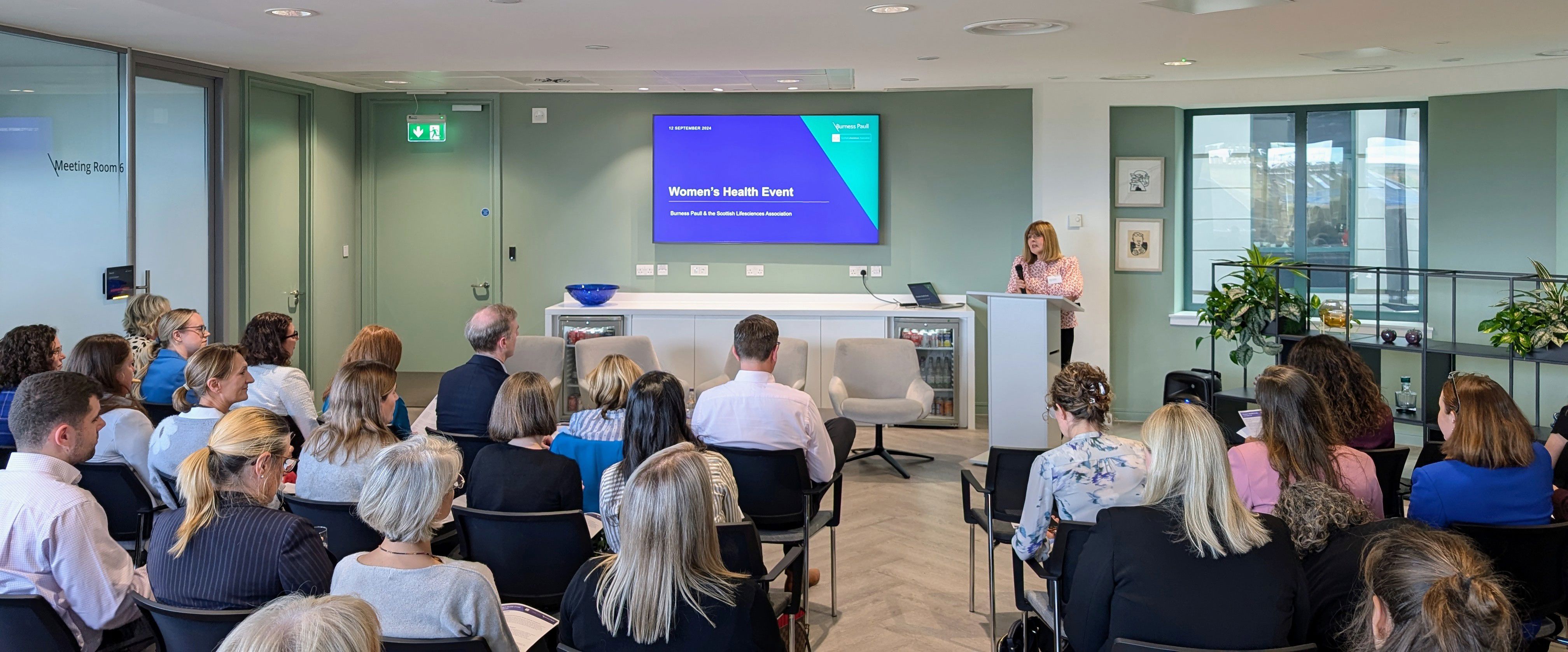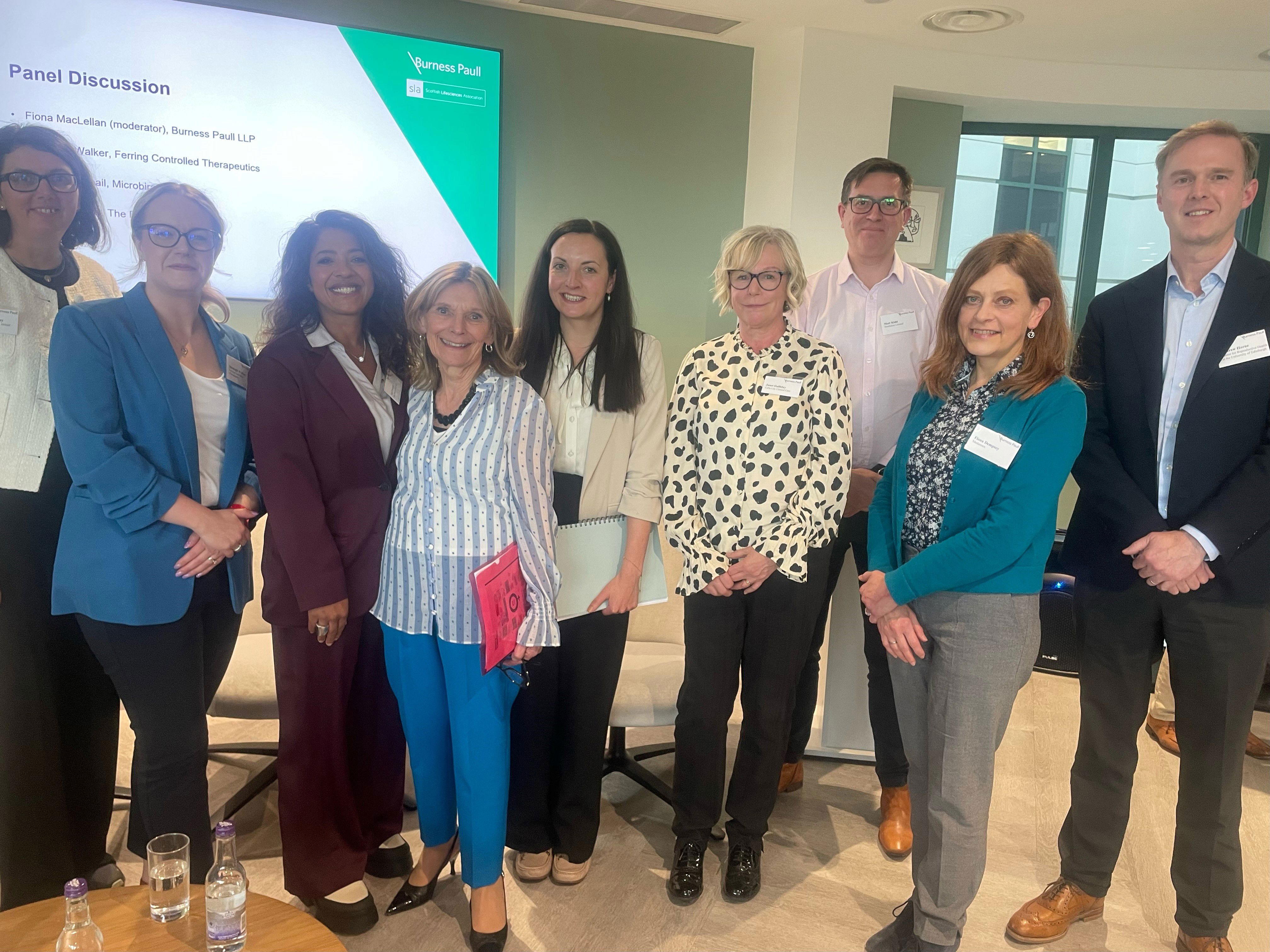A Scottish Lifesciences Association and Burness Paull event to showcase innovation in women’s health
Women and girls may make up more than half the population, but their health needs have historically been neglected by health researchers. Even today, women’s health accounts for only a tiny fraction of healthcare research funding, in spite of enormous unmet need.
This troubling situation formed the backdrop to a pioneering women’s health event hosted by Burness Paull and the Scottish Lifesciences Association (SLA). It showcased the cutting-edge Scottish life sciences companies working to change the story on women’s health and highlighted the social and business benefits of doing so.

Fiona Nicolson, Head of Life Sciences at Burness Paull introduces the event
A history of poor funding
The need for concerted action could not be clearer. Even in the United States, with its generous investment in health innovations, women’s health represented just two per cent of the $41.2 billion (more than £30bn) in venture funding that went to the entire healthcare industry in 2023, according to Deloitte’s analysis of PitchBook data.
This reflects a long-term story of oversight and neglect. It was less than 50 years ago, in 1977, that the US Food and Drug Administration (FDA) recommended that women of child-bearing age be excluded from clinical trials due to fears around the possible impacts on unborn babies. Though this was reversed in 1993, women are still substantially underrepresented in clinical trials on treatments for major illnesses, according to a study by Harvard Medical School in 2022.
This has had far-reaching consequences for women’s health, creating a pressing need for better diagnostics and treatment for women.
Attendees at the Burness Paull hosted event heard that endometriosis, a painful, debilitating condition in which womb tissue grows in other parts of the body, takes more than eight years to diagnose in Scotland. They heard that ovarian cancer is already the eighth most common cancer and due to increase in incidence by 55 per cent by 2050, but that treatment options are sadly limited. They heard that even today, women are dying in childbirth at a rate of around 300,000 a year globally.
Innovation across the health spectrum and into the workplace
The event, which took place at Burness Paull’s Edinburgh office on September 12, platformed Scottish companies that are working to improve outcomes in all these areas by developing exciting, innovative diagnostics, pharmaceutical products and medical devices.
It also shone a light on women’s health in the workplace, highlighting companies in Scotland with market-leading policies that support women at all stages of life – companies like Ferring Pharmaceuticals. The firm’s Building Families policy includes a commitment to financially support permanent employees’ fertility journey in whatever form it takes, including assisted reproduction, preserving fertility, surrogacy or adoption.
Scotland-based companies pushing the boundaries in women’s health
The story of Ferring Pharmaceuticals underlines how small life sciences companies collaborating with academics in Scotland can achieve global success and lead the way on women’s health.
The company is described by Dr Shonagh Walker, head of pharmaceutical development at Ferring Controlled Therapeutics, as “the biggest pharmaceutical company you haven’t heard of”. Ferring manufactures products that are widely used in reproductive care including Propess, used in the induction of labour. Medium-sized, privately owned and research-driven, Ferring has premises globally including a site in East Kilbride with 112 employees.
The East Kilbride site began life as Controlled Therapeutics, a spin-off from the University of Strathclyde which was fully acquired by Ferring in 2011. Controlled Therapeutics, a drug-delivery company, developed Propess from conception, through clinical trials to market. Nineteen million units have been sold to date in over 60 countries. Dr Walker said: “Ferring is committed to researching and developing treatments in areas of high unmet need, including in areas like male and female infertility, recurrent pregnancy loss and preterm birth.
“We recognise that millions of people worldwide lack the care and treatment they need to build their family.”
Ferring’s global pharmaceutical development team has created a heat-stable treatment for postpartum haemorrhage particularly suited for use in low- and middle-income countries which is helping cut maternal mortality.
That commitment to improving women’s health outcomes is shared by companies across the Scottish biotech sector.
Medannex is an early clinical-stage biotechnology company based in Edinburgh. They have created and patented the first medicine to target a protein called annexin-A1 that, when overexpressed, drives cancer, autoimmunity and a range of other conditions. The company is currently looking to treat a range of different tumour types, including triple-negative breast cancer, which has a very poor prognosis, and ovarian cancer.
Fiona Dempsey, director of scientific operations at Medannex, reported that the first-in-human phase one oncology trial is ongoing and already showing very encouraging signals. Medannex’s medicine appears to be controlling disease in patients who have exhausted all other treatment options, without causing any significant side effects.
Chair of the event, Dr Janet Halliday, board adviser to Calla Lilly Clinical Care, described a drug delivery device for administering progesterone into the vagina where there is the risk of miscarriage, while Dr Matt Kidd, director of R&D at Stirling-based Emblation Ltd, explained how the company makes microwave generators to treat a range of dermatology and oncology conditions and is currently looking at treatments for high-risk HPV lesions, particularly in the cervix.
Two other speakers, Dr Elizabeth Fairley, Chief AI Officer of Talking Medicines, and Marianne Ismail, founder, director and chief executive of Microbira, shared their thoughts on securing funding.
Microbira, which does work using spectroscopy and artificial intelligence to identify types of bacteria quickly, said: “It’s not easy getting funding but just getting started, having a very clear idea of what you’re doing and sticking to it, tends to mean that you can convince people to invest with you.”
Dr Fairley described how her company, which uses AI to extract intelligence from conversational data between patients and health care professionals, was based in Scotland and New York. She explained: “There’s an amazing ecosystem here to develop and to support growing healthcare tech businesses but it’s also really nice to be in the US where there’s such a big market.”
She added: “Within health tech, the growth within the market here in the UK is a phenomenal figure of £9bn in the next few years but that is in comparison to figures in the US of £280bn.”

from left to right: Dr Elizabeth Fairley, Dr Shonagh Walker, Dr Sigi Joseph, Marianne Ismail, Fiona MacLellan, Dr Janet Halliday, Dr Matt Kidd, Fiona Dempsey, Professor Andrew Horne
Investment challenges
The value for life sciences companies in accessing the US market was one highlighted by Scott Johnstone, chief executive of the Scottish Lifesciences Association. Speaking afterwards, he pointed to the harsh realities of securing funding for products which are not aimed at the whole adult market.
“Women’s health is just over half the market, so the total market size is significantly reduced,” he said. “From an investor point of view, it’s really difficult to get investment for smaller markets.”
US healthcare providers, with large budgets, are in a stronger position to buy innovative new products. He stressed the importance of the event in underlining the Scottish sector’s commitment to women’s health, adding: “It allows people to understand what’s going on in Scotland, and how good we are at developing products.”
A critical role for Scottish universities
Scotland’s universities play an internationally important role in research, often collaborating with biotech companies. Attendees heard about a potentially game-changing piece of work on endometriosis led by Professor Andrew Horne, director of the Centre for Reproductive Health at the University of Edinburgh. It could lead to desperately needed improvements in diagnosis and help create better personalised care.
Endometriosis, which affects 1.5m women in the UK alone, can lead to infertility, gastrointestinal and urinary symptoms, and chronic fatigue. There is currently no cure.
In the Endo 1000 study, researchers will work closely with 1,000 people who have endometriosis over two years, measuring everything from sleep patterns and pain scores, to behaviour changes and bio samples. “Using AI and machine learning, we’re going to look at all this data and try and look at patterns to develop a non-invasive test for endometriosis,” Prof Horne explained.
Improving wellbeing in the workplace
Unsurprisingly, endometriosis is one of several health issues that can significantly impact women’s ability to work. The importance of inclusive workplace policies was the second key theme of the event and the subject of impassioned discussion.
Ferring’s best-in-class HR approach not only includes supporting employees’ fertility journey but also offering a minimum of 26 weeks parental leave for both birthing and non-birthing parents. It was described by panel chair Fiona MacLellan, director in the employment law team at Burness Paull, as “transformational”.
Burness Paull itself is a leading employer in supporting the health and wellbeing of women, becoming the first accredited “menopause friendly” employer in Scotland – as well as the first UK law firm to achieve the status.
Panel member Dr Sigi Joseph, GP partner and co-founder of The Doctor Explains which brings health information to businesses, stressed the importance of supporting the female workforce, a third of whom are over 50. She said: “If you don’t support women to stay in work, you lose talent. There’s a socio-economic impact of women giving up work with symptoms that actually could be supported or helped.”
Fiona MacLellan responded that “creating a workplace culture that is open and inclusive, where women can discuss their health challenges if they choose, is therefore critical not just for staff wellbeing but for recruitment and retention”.
From improving HR policies to developing new treatments, this inaugural women’s health event underlined that Scottish companies are already leading the way on women’s health – even if there’s a long way to go.
Related News, Insights & Events

Burness Paull & the Scottish Wholesale Association webinar: The new duty to prevent sexual harassment in the workplace
13/05/2025 - Online
Webinar discussing the new duty to prevent sexual harassment in the workplace.

Health Trends in 2025: What we’ve seen and what’s to come
As we enter Q2 of 2025, what are some of the key trends across life sciences and health and care that we’ve seen so far, and we think are likely to play out over the remainder of the year?

Top tips for implementing and managing effective neonatal care procedures
The Neonatal Care Leave and Miscellaneous Amendments Regulations 2025 provides parents with a new entitlement of to up to 12 weeks’ leave and pay whilst their child requires neonatal care.





